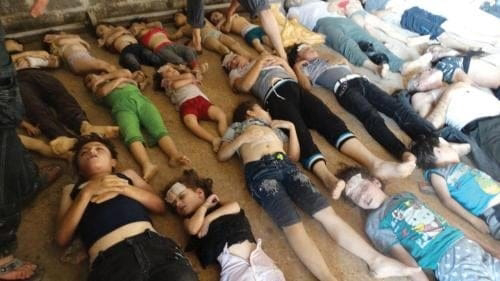Syria's Grim reality: The unforgivable Use of Chemical Weapons Against it's Own Citizens
Since 1963, Syria has been governed by the Alawite Assad family, a minority group constituting 25% of the population. This prolonged rule has left the Sunni Muslims, comprising 74% of the population, with unequal representation, often facing discrimination. The tensions escalate further with violence directed at Kurds and other ethnic minorities such as assyrians, Turkmens, Armenians , leading the nation into a persistent civil war since the eruption of the Arab Spring in 2011. This wave of protests triggered a surge in violence and a refugee crisis. In an attempt to suppress dissent and minority voices, the Assad regime has resorted to the egregious use of chemical weapons, resulting in severe human rights violations. The multifaceted challenges in Syria have created a complex and ongoing crisis that continues to reverberate both regionally and globally.
Bodies of victims of a suspected chemical attack on Ghouta, Syria on Wednesday, August 21, 2013. © 2013 AP Photo/Shaam News Network
On August 21, 2013, a chemical attack using sarin gas struck a Syrian rebel town in Ghouta, leading to extensive condemnation from the United Nations and its member states. In response, President Obama issued a red line ultimatum to the Syrian Baathist government, seeking authorization from the US Congress for military intervention. However, the prospect of military action was averted as, on September 11, 2013, the Assad government agreed to comply with a framework negotiated by the USA and Russia. This framework mandated the destruction of all Syrian chemical weapons by June 14, 2014. Consequently, the Syrian government, signaling its commitment to disarmament, acceded to the Chemical Weapons Convention on October 14, 2013. This diplomatic resolution marked a pivotal moment in the efforts to address the use of chemical weapons in the Syrian conflict.
A Syrian man collects samples from the site of the suspected toxic gas attack in Khan Sheikhun. Photograph: Omar Haj Kadour/AFP/Getty Images
. USS Ross fires a Tomahawk missile towards shyrat airbase ( a work of sailor or employee in the US Navy) Wikimedia commons
On August 18, 2014, the Syrian government claimed to have either destroyed or declared all its chemical weapons. However, intelligence communities raised concerns, suggesting the possibility of undeclared stockpiles. These suspicions were fueled by a tragic event on April 4, 2017, when the Assad-led Syrian government allegedly launched a chemical attack on Khan Sheikhoun town in Idlib governorate, employing sarin and chlorine gas and resulting in numerous fatalities. In response, the U.S. took unprecedented unilateral military action on April 7, 2017, launching cruise missiles from the Mediterranean Sea towards the Shayrat air base. This move, aimed at deterring the use of chemical weapons, incurred casualties and drew condemnation from Russia. The incident strained U.S.-Russia relations, leading to the suspension of the military hotline intended to prevent aircraft collisions in Syrian airspace. The delicate framework surrounding the Syrian government's commitment to disarmament faced scrutiny, underscoring the complexities and fragility of international efforts to address chemical weapons proliferation.
A Syrian girl holds an oxygen mask over the face of an infant after a gas attack on Douma. Photograph: Hasan Mohamed/AFP/Getty Images
On the ominous date of April 7, 2018, the Syrian government perpetrated a heinous act against the civilians of Douma, unleashing a chemical assault employing chlorinated organic compounds. In swift retaliation, the United States, the United Kingdom, and France executed military measures, garnering endorsement from their Western counterparts but drawing sharp rebuke from Iran and Russia, who decried the operation for its resultant casualties and perceived unilateralism. Regrettably, subsequent reports unveiled a disconcerting pattern of repeated chemical attacks on civilians, casting a grim shadow over Syria's conduct. This alarming trajectory culminated in the suspension of Syria from the Organization for the Prohibition of Chemical Weapons (OPCW) in April 2023, accompanied by the stark isolation of the nation from the global community. The dire consequences of these events linger, casting profound uncertainty upon the destiny of Syria's chemical weapons and the ongoing humanitarian crises inflicted upon its beleaguered populace.





Comments
Post a Comment